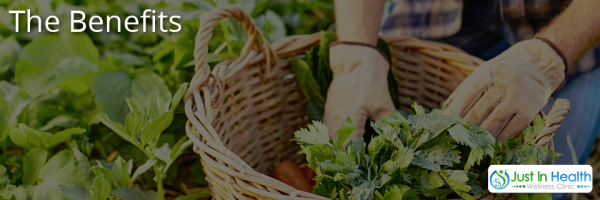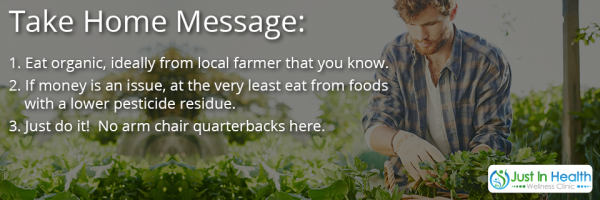
By Dr. Justin Marchegiani
Today eating organic has been the trendy thing of late. Add gluten free and paleo to the mix and it just makes it even more confusing. Alright so let’s break it down… What is organic actually?
Organic Food: Is food that isn’t grown with pesticides, herbicides, fungicides and is GMO free. Depending on the organic certification some are stricter than others. Certain certifications require farm fields to have not used pesticides for at least 3 years and others are much looser in regards to their regulations. Your best bet is to get to know some local farmers in your area and figure out what standards they adhere to. You may even find many farmers don’t bother paying for an organic certification even though their crops are just as good as organic ones.
Check out www.eatwild.com or www.eatwiththeseasons.com to figure out where you can access local organic food and farms in your area. Many towns have local farmers markets that meet weekly in downtown areas and sell their goods directly to consumers.
In regards to animals, organic refers to animals that haven’t been injected or fed various medications including hormones, antibiotics or foods that were produced with pesticides or other chemical agents.
Again animals can still be fed an unnatural diet, I.E. chickens being fed soy and flax and cows being fed grains. It’s important to know what is natural for a given animal’s diet, organic or not, if an animal isn’t designed to consume it, the animal won’t be as healthy for you to eat as it could have been.
Remember, healthy animals help make a healthy you. It’s virtually impossible to consume sick and toxic animals and plants and expect to create health out of it. Said another way, you can’t make chicken salad out of chicken crap.

The Benefits: So eating organic does provide many benefits. The first is that you are not providing additional toxins to your body from all of the above mentioned toxins that are abundant in conventional farming. That alone is a huge plus! Research also shows a robust increase in nutritional value when comparing organic food to non-organic.
Click here to know more about the benefits of going organic.
The pesticides and other chemicals that are used in conventional farming have a terrible effect on the microbiota and minerals that are present in the soil. Plants can only be as healthy as the soil, so healthy soil=healthy plants that taste good and are nutritionally dense.
There is a great deal of misinformation put out there by multi-national corporation like general mills or Kellogg’s to name a few that say, organic and conventional food have the same nutritional value.
These huge corporations have created their own organic labels, and have thus downgraded the overall meaning of what organic represents and stands for. When you compare organic food from a local farmer who practices organic farming methods, you will see these conventional foods don’t hold a candle to it.
Again even if the nutritional value doesn’t sell you on going organic, just the fact that you aren’t consuming know carcinogenic hormone disrupting toxins should be enough of a benefit by itself.
Cool Story… Did you know that researchers at the University of Florida found that in the everglades female alligators weren't reproducing at a normal rate due to the severe reduction in size of their male alligators’ genitalia! All the males reading this post, I hope I have your attention by now!
When these male alligators’ blood was drawn, they had nearly the same estrogen levels of their female counterparts. Researchers have attributed the pesticide run off as the cause because of its estrogen like effects (xeno-estrogens). These synthetic estrogens play a major role in infertility, decreased libido and muscle mass in men and women alike.
PS: These same estrogen's are also found in plastics too. If you are drinking or eating out of plastic containers, you may want to switch to glass or stainless steel containers.
Reference: The Disappearing Male (Documentary)

Take Home Message:
Need help in going organic? Click here.